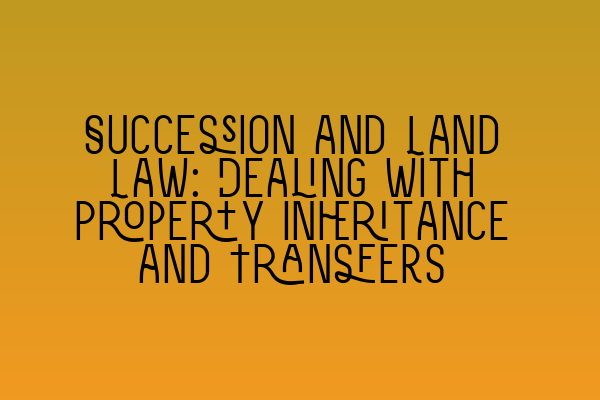Succession and Land Law: Dealing with Property Inheritance and Transfers
Welcome to SQE Property Law & Land Law! As a leading solicitor firm specializing in property law, we are here to guide you through the complex world of succession and land law. In this blog post, we will discuss everything you need to know about property inheritance and transfers. So, let’s dive right in!
Understanding Succession in Land Law
Succession is a crucial aspect of land law that deals with the transfer of property rights after the death of the owner. When a person passes away, their property needs to be transferred to the rightful heirs or beneficiaries. This can be a complex process that involves legal procedures and documentation.
First and foremost, it is important to establish whether the deceased had a valid will or not. A will is a legal document that outlines the distribution of assets upon death. If a will exists, it needs to be probated, which means it needs to go through a court process to determine its validity. If the will is deemed valid, then the property will be distributed according to the wishes outlined in the will.
On the other hand, if the deceased did not leave a valid will, the property will pass according to the rules of intestacy. These rules determine how the property should be distributed among the surviving family members. The rules of intestacy prioritize close relatives, such as spouses, children, and parents, in the distribution of assets.
The Transfer of Property Rights
Once the succession process is completed and the rightful heirs or beneficiaries are determined, the property rights need to be transferred. This involves transferring the legal ownership of the property from the deceased to the new owner(s).
The most common way to transfer property rights is through a process called conveyancing. Conveyancing involves various legal tasks, such as drafting contracts, conducting property searches, and ensuring all necessary legal requirements are met. It is important to engage a qualified solicitor to handle the conveyancing process to ensure a smooth and legally sound transfer of property rights.
In some cases, property transfers may also involve the need to update the Land Registry. The Land Registry is a government department that maintains records of land and property ownership in England and Wales. Updating the Land Registry ensures that the new ownership is officially recorded and recognized.
It is worth noting that property transfers can also occur during the owner’s lifetime. This can happen through various means, such as gifting the property, selling it, or transferring it as part of a divorce settlement. Each of these scenarios carries its own legal intricacies, and it is essential to seek expert legal advice to navigate through them.
Ensuring a Smooth Process
Succession and property transfers can be complex and emotionally charged processes. Therefore, it is crucial to have a comprehensive understanding of the legal framework and enlist the support of a qualified solicitor with expertise in property law.
At SQE Property Law & Land Law, we have a team of experienced solicitors who specialize in property law and succession matters. We are here to provide you with the necessary guidance, support, and expert advice to ensure a smooth and legally sound process. Our goal is to make the experience as stress-free as possible, allowing you to focus on what matters most during such a challenging time.
Remember, understanding the legal aspects of property inheritance and transfers is key to protecting your rights and ensuring the wishes of the deceased are honored. So, don’t hesitate to reach out to us for expert assistance.
Related Articles:
– Understanding Contractual Capacity: Rights and Limitations
– Interactive SQE Mock Tests for Contract Law: Test Your Knowledge
– Join Our SQE Contract Law Webinars: Expert Insights and Guidance
– Contract Law Reforms: An Analysis of Recent Changes
– Parties in a Contract: Rights and Responsibilities
We hope you found this article informative. If you have any questions or require our professional assistance, please do not hesitate to contact us. Let us handle the legal complexities while you focus on the things that matter.
